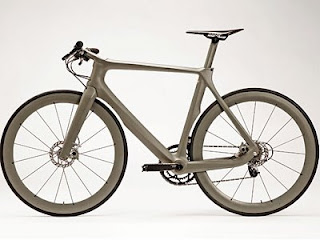 A couple of months ago, I posted about the Cannondale Stealth concept bike, which was displayed at Eurobike in September. Today, I noticed a Bike Hugger post that pointed to a Design Llama post about the bike. Several of the commenters to the Bike Hugger post didn’t seem to like the design, which I personally think looks pretty nice. I don’t really understand the Magic Motorcycle reference either. I guess the person who made that comment was referring to the hard edge styling on this frame, but it seems like a stretch to me. I don’t know for sure, but I would guess that this concept bike was influenced more by automotive design and by other consumer products than it was by an older bike design. As I have said before, I think it is important to look outside the industry for inspiration and my guess is that is what Erik and Torgny did in this case.
A couple of months ago, I posted about the Cannondale Stealth concept bike, which was displayed at Eurobike in September. Today, I noticed a Bike Hugger post that pointed to a Design Llama post about the bike. Several of the commenters to the Bike Hugger post didn’t seem to like the design, which I personally think looks pretty nice. I don’t really understand the Magic Motorcycle reference either. I guess the person who made that comment was referring to the hard edge styling on this frame, but it seems like a stretch to me. I don’t know for sure, but I would guess that this concept bike was influenced more by automotive design and by other consumer products than it was by an older bike design. As I have said before, I think it is important to look outside the industry for inspiration and my guess is that is what Erik and Torgny did in this case.
I first read about the e2 transport series episode called “Paris: Vélo Liberté” on Bike Snob NYC of all places. For those of you who are not familiar with e2 (actually it is e-squared, but I can’t get the 2 to appear as a superscript in the post), it is “a critically acclaimed PBS series about the innovators and pioneers who envision a better quality of life on earth, socially, culturally, economically and ecologically.” e2 is sponsored by Autodesk, and as you might assume it focuses on innovative technologies and design ideas that can help solve the world’s environmental and social problems. That sounds like a series that would really be of interest to me, so I was disappointed when I checked my local listings and learned that it is not playing on my local PBS station. Here is the good news though; all of the shows in the e2 transport series will debut online staring this Monday, November 24th. The episode about the Vélib bike-sharing program in Paris starts on December 1st and will be streamed online for one week from the debut date. Check out the site and click the webcast tab for more information. I can’t wait to watch it; in fact, I am looking forward to all six e2 transport episodes.
On the subject of transport, I can’t help but mention the whole GM/Ford bailout idea. Not to oversimplify the management problems in Detroit, but if the two companies had been focused on designing and producing viable products several years ago, they wouldn’t be in the current situation. Instead, the bigwigs at both companies were focused on short-term profits, while completely ignoring the foreseeable future. I say let them fail and put that federal money into bicycle infrastructure instead. A New Deal like program of bike lane and path building could create new jobs right here in the U.S, right? While we are at it, why not create a federal program to build, in addition to the transit oriented cycling projects, more velodromes and mountain bike trails all across the country. Those projects could create even more jobs here in America. OK, I admit, I am not completely serious about that idea (not the second part at least) but I do think that giving federal dollars to businesses that are failing due to gross mismanagement is a really, really bad idea. For a slightly less biased perspective on the GM/Ford situation though, read this MSN Money post. Here is the quote from the article that jumped out at me:
“They also need to realize that consumers are looking for ways to conserve energy and reduce the costs associated with the upkeep of their car. The fact that Ford re-opened their F-150 plant as soon as gas prices came down is reason enough to send management their walking papers.”

Leave a Reply to Petro Cancel reply